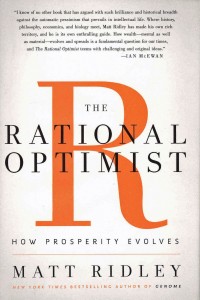
I’m reading a fascinating book right now called the Rational Optimist. It has lots of amazing research and information about how societies thrive when there’s plenty of trade, and shrivel up when authoritarian regimes shut down the free flow of ideas and trade.
In fact, it’s made me take a good look at my own life and resist my own urge to try to be completely self-reliant. I’m much more comfortable specializing in creating software, and less anxious about having a mechanic fix my car. (I should be able to do everything… dammit!)
Focus on the things you’re good at, and then pay money to let other people focus on the things they’re good at, and the whole economy will do better.
But one quote in the book really resonated with me, and the underlying concepts that flow from it.

“past bursts of human property have come to naught because they allocated too little money to innovation and too much to asset price inflation or to war, corruption, luxury and theft.” – The Rational Optimist: How Prosperity Evolves by Matt Ridley.
In other words, society moves forward when we invest in innovation, and it declines when we spend money on war and luxury.
The problem is that as a citizen of a country you don’t have a lot of control over how your money gets spent: innovation or war, luxury or research.
Sure, you can vote the government out and replace it with one more to your choosing, but that whole process is very time consuming, and often none of the choices reflect your priorities.
Don’t blame me, I voted for Kodos.
If innovation is a huge priority for you, there are a few ways you can effect it directly. You could be a scientific researcher and do the work yourself. Or you could invest in an organization that puts a significant amount into research and development, like 3M.
But for the regular person, once you’ve voted, you’re out of options for how to push innovation forward.
I think this is one of the benefits of HeroX. It gives regular people a way they can invest directly in innovation, and see the results.
Ready to dive right in? Launch your own challenge in 5 easy steps here.
And so, if the prize is eventually won by a team that creates a better method of desalination, or nutrition, or a self replicating robot, your money directly contributed to the innovation.
Without your commitment and shared resources of other like-minded people, these innovations might never happen.
So now you have a new way of investing in innovation.
Instead of waiting for your government to invest in innovation (and not war or luxury), or your company, or someone else (it’s always someone else), you get to invest this money directly in innovation, and know your money made the world a better place.
What next? Go find a challenge you like and help share it with your networks or even participate yourself! It’ll demonstrate your commitment to open innovation.








